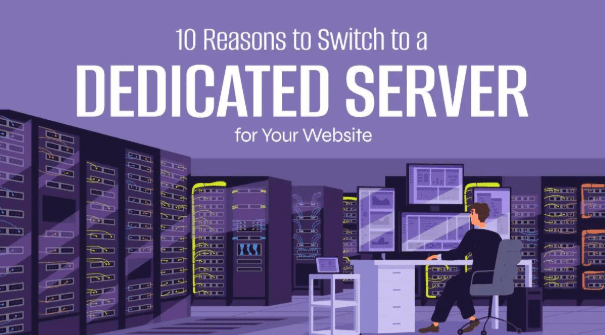Introduction
Have you ever dealt with your website slowing down when traffic increases or even worse, crashing unexpectedly? If so, it may be time to upgrade your hosting solution. As businesses grow and digital demands intensify, shared or VPS hosting simply cannot provide the stability and performance that modern websites require.
That’s where the Best Dedicated Server comes into the picture, especially built for businesses that need reliable uptime, a more secure environment, and full control over their hosting experience. In this blog, we will explore 10 reasons that will tell you how switching to a dedicated server will be the best decision for your growing web presence in 2025.
What is a Dedicated Server, and how does it work?
It exhibits its literal meaning. A Dedicated server means a physical server assigned to a single organization; no other organization has shared space on that server. As you know, we need a physical server to host, or can say run your applications and websites, so that your users can access your service easily.
Here comes the role of hosting providers, who manage the physical server resources and allocate them to different customers. Now it depends on the choice of your hosting solution; you may end up sharing the physical server resources with other organizations.
But, if you go for the best dedicated servers hosting, you will get complete control over how your organization uses the server resources. You will be provided with an isolated physical server environment that can be configured and managed as required. The best dedicated server is primarily helpful for critical applications or compute intensive workloads, as the app demands isolated server resources.
Difference between Shared, VPS and Dedicated Server
For a better understanding of the value of a dedicated server, let’s compare it to shared and VPS hosting. Each server provides you with a different level of features, shown in the table below:
| Feature | Shared Hosting | VPS Hosting | Dedicated Server |
| Resource Allocation | Shared among multiple users | Virtualized but still shared | Fully dedicated to one user |
| Performance | Moderate, depends on others | Better, but variable | High and consistent |
| Security | Low | Medium | High |
| Control & Customization | Limited | Partial | Full root access |
| Ideal For | Small websites, blogs | Medium traffic apps | High-traffic or enterprise workloads |
10 Reasons to Switch to a Dedicated Server
-
Top-Notch Security and Privacy
If your website is part of a shared hosting, vulnerabilities of one website are most likely to impact other websites on the same server. A dedicated server means that your data, application, and credentials are completely isolated from all other clients on the server. You can set up custom firewalls, intrusion detection systems (IDS), and any security policies you need.
This is especially valuable for the industries required to manage sensitive data (e-commerce, healthcare, finance) needing to comply with standards (e.g., PCI DSS, HIPAA).
-
Better Customization
Dedicated servers allow complete and real flexibility in the configuration of software, operating systems, and applications. You can set up your environment exactly as you need it, whether it is a specific version of PHP, a particular database, or specific proprietary tools, this is something not possible in shared hosting environments. This customization enables developers to optimize server performance for unique use cases, from gaming servers to enterprise-grade web apps.
-
Higher Reliability and Uptime
If you are not bound to share your resources with other users, your website will experience stable performance even during peak traffic hours. Dedicated hosting plans often include guarantees for 99.99% uptime and offer redundant network connections, dramatically reducing the risk of downtime.
If your business’s reputation or overall revenue depends on the performance of your website, reliable service is non-negotiable. The best dedicated servers provide peace of mind for exactly this type of uptime and reliability.
-
Static IP Address
All dedicated servers come with at least one unique IP address, making all email deliverability smoother and improving API integration and SSL quality of service.
While a shared IP address could get blacklisted if another user on the server engages in spam, a unique static IP address would allow you to protect your domain reputation and keep the business communications that you conduct secure and uninterrupted.
-
Exclusive Resource Access
With dedicated hosting, all system resources like CPU, RAM, storage, and bandwidth will be yours alone. This exclusivity will keep you away from stressing yourself about peak-hour website performance, as you will have all resources reserved for the specific website only.
The end result? Faster response times, consistent page speed, and the best user experience. It is a must for e-commerce sites or SaaS applications that require real-time responsiveness.
6. Enhanced Performance
The best dedicated servers are designed for high throughput, low-latency performance, and can handle thousands of concurrent requests without a hitch.
It comes with SSD storage, caching, and powerful processors like Intel Xeon or AMD EPYC, making it the best solution for AI workloads, big data analytics, and enterprise content management systems.
-
Compliance Readiness
If your organization needs to comply with data-handling regulations like GDPR, HIPAA, PCI DSS, etc., then a dedicated server will work best instead of a shared server, as it gives you the control necessary to meet the standards. You can enforce custom encryption, data retention, and audit policies, helping your business maintain compliance without giving it a second thought about security.
-
Web Hosting Provision
Many agencies in different industries use a dedicated server to host multiple websites under one roof for their different clients. The ability to allocate virtual machines or containers for each client, while maintaining performance isolation, makes dedicated servers ideal for resellers and web hosting providers.
-
No Risk of the “Bad Neighbour” Effect
In a shared hosting solution, one terrible written website can slow down every other website on that server at the same time. This will not happen at all with a dedicated server, as the resources are not in contention; your server runs only your processes, ensuring performance remains stable no matter what.
-
Better Control Over Backups and Updates
Having a dedicated server allows you to set your own backup schedules, storage retention, and update times. In essence, you can back up important data every day or even in real-time, without waiting for a hosting service’s lagging automated backup system.
For updates, you can also determine when and how you will deploy them – very important in a mission-critical environment where every second of downtime must be strictly controlled.
Things to Keep in Mind While Choosing a Dedicated Server
When choosing a dedicated server, it is crucial to evaluate hardware, network, security, scalability, and cost according to your project or business needs. Below is a checklist of key considerations:
Hardware Specifications: Assess the CPU type, number of cores, RAM size, and storage (HDD vs SSD). Future scalability of hardware is important for growing needs.
Network Speed and Bandwidth: Check the speed (often in Gbps), monthly bandwidth allowance, and network redundancy to ensure smooth performance under heavy loads.
Security Features: Look for built-in firewalls, DDoS protection, automated backups, SSL certificates, and compliance requirements (PCI DSS, GDPR, HIPAA).
Location of Data Center: The server’s geographical location affects latency, website load times, and data compliance; choose a location close to your users if possible.
Reliability and Uptime Guarantees: Choose providers that offer high network uptime (at least 99.9%) and strong service-level agreements (SLAs).
Operating System and Software Support: Ensure compatibility with your required OS (Linux, Windows) and needed applications or management panels.
Scalability and Flexibility: Look for easy upgrade paths for CPU, RAM, or storage, as well as flexible contracts to adapt resources and costs as you grow.
Customization Options: Providers should enable full customization of hardware and software to meet your specific requirements.
Transparent Pricing: Be aware of all fees (setup, maintenance, extra bandwidth), and balance cost with performance and reliability.
Provider Reputation and Support: Review customer feedback, uptime record, support quality, and industry experience for peace of mind and prompt technical help.
Carefully considering these factors will help you find the best dedicated server that is secure, reliable, and suited to your technical requirements and growth plans.
Invest in Your Growing Business
If you have reached the point in your business where growth is inevitable and reliability has become non‑negotiable, then a dedicated server is a long-term investment that you should consider. Dedicated hosting will allow you to support heavy traffic websites, advanced applications, and complex databases while also ensuring stable uptime with enhanced security.
Whether you are running a SaaS product, an E-commerce site, or an enterprise-level application, “moving to a dedicated server will allow your infrastructure to scale in a parallel direction as your business goals.”
Frequently Asked Questions
Q1. Can I upgrade my dedicated server later?
Ans. Yes. You can add more RAM, switch to faster storage, or upgrade the CPU.
Q2. How much does dedicated hosting cost?
Ans. It can be as low as $70 and can go as high as $300+, so choose according to your need, whether you want basics or need to use premium offerings.
Q3. Do I get root/admin access?
Ans. Yes, dedicated hosting provides root or administrator access, enabling full control over the server’s configuration and software. It’s not always given as default; in some cases, you need to request for access.
Q4. WILL I GET A DEDICATED IP ADDRESS WITH DEDICATED SERVER HOSTING?
Ans. Yes, dedicated servers provide at least one dedicated IP address, so your site, APIs, and email have unique addressing and improved control over certificates and security policies.



































